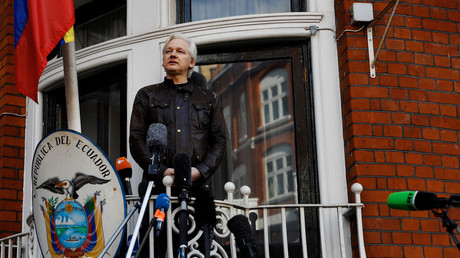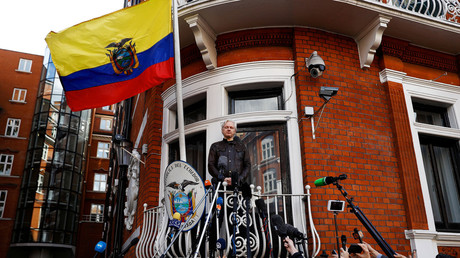US has no interest in hearing what Julian Assange can freely say about Russiagate – Max Blumenthal
The rejection by ‘Russiagate’ investigators in the US to interview WikiLeaks founder Julian Assange shows that they are not interested in hearing him out, journalist Max Blumenthal told RT.
Assange, who is currently incommunicado in the Ecuadorean embassy in London, reportedly offered - through an intermediary - to talk to US investigators about the release of DNC documents by WikiLeaks during the 2016 US election campaign.
US intelligence claims that WikiLeaks acted on behalf of Russia as part of a campaign to prop up the candidacy of Donald Trump and undermine that of Hillary Clinton. The offer was flatly rejected by Representative Adam Schiff, the ranking Democrat on the House Intelligence Committee, who said Assange would only be interviewed if he is in US custody.
“The US has no intention of interviewing Julian Assange except under duress, possibly after a long period of solitary confinement, the kind that Chelsea Manning endured,” journalist Max Blumenthal told RT, referring to the whistleblower, whose leak to WikiLeaks of classified US material exposing abuses in Iraq lead to her nearly seven-year confinement. Schiff is “the de facto grand inquisitor of the Russiagate investigation”, he said, so he presumably speaks for the entire US intelligence community.
No WikiLeaks people were publicly accused of having a hand in the supposed hacking of the DNC computer network and that the narrative of the hacking itself is on a very shaky foundation, Blumenthal remarked.
“They don’t want to interrupt their narrative with what could be facts very similar to the case of the hacking of the Democratic National Committee. The DNC has never handed over its servers to any US intelligence or law enforcement agency and has likely destroyed those servers,” he said. “It seems like the US does not want to know what’s in them just as the US only wants to know what Assange has to say only after he has been sufficiently held and intimidated.”
Blumenthal says Assange is rightfully afraid of leaving the Ecuador embassy because of his claim that he would then be grabbed by the UK law enforcement and extradited to the US under a classified indictment - the existence of which neither Washington nor London will confirm. If put in US custody, he is likely to become the first person prosecuted in America for what is essentially a journalist revealing classified information, he added.
“You have the whole beltway press corps howling about [US President Donald] Trump being mean to them and criticizing them. But almost no one in Washington in the press corps will stand up and defend Julian Assange as a fellow journalist,” he said. “This is a case that sets a precedent for the rest of the media in how other journalists would be treated if they reveal classified information. And it seems like there is little concern about it in the journalistic community in the West.”
The lack of support is because the US intelligence community smeared WikiLeaks and Assange personally, calling them a non-governmental intelligence agency and a Russian agent respectively, Blumenthal said, adding that the smear campaign didn’t bother to provide any proof.
“This narrative is almost impossible to challenge. It is simply the CIA’s narrative accepted hook, line and sinker by the New York Times, the Washington Post and all of the major cable media news networks,” he explained.
Assange was given political asylum under the leftist Ecuadorean President Rafael Correa. His successor, Lenín Moreno, has put the country on the path of rapprochement with the US. Moreno is apparently under pressure from Washington to have Assange kicked out of the embassy, which would essentially require him to violate the Ecuadorean law banning extradition of its citizens to foreign nations, Blumenthal said.
“Julian Assange is an Ecuadorean citizen. The Ecuadorean president Lenín Moreno has acceded to US wishes on so many points and said that Julian Assange is a problem he inherited,” he said. “It’s really up to [Moreno] to decide between the pressure that he is receiving from the US, which has just signed a joint military agreement with his country, and the rule of law, the Ecuadorean constitution, which forbids him from handing over an Ecuadorean citizen like Assange to the United States or the UK.”



0 Comments:
Post a Comment
Subscribe to Post Comments [Atom]
<< Home